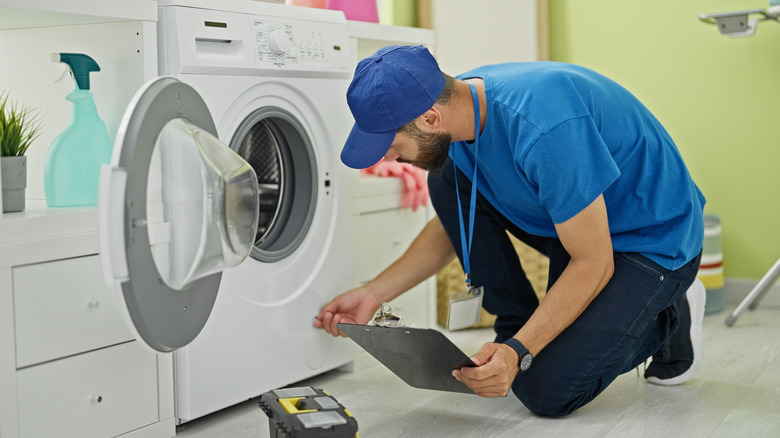Should You Buy Refurbished Appliances To Save Money? Consider These Things First
Whether you're replacing one major appliance or outfitting an entire home, finding the best deal can help to free up space in your budget. The best time of year to purchase a new home appliance to save money is often late fall through the end of the year for large appliances. Sales associated with certain holidays or times, such as Memorial Day, Veterans Day, and Black Friday, may also earn you major savings on your new appliance purchase. For some people, even the hottest appliance sales of the year aren't enough. When you want even deeper price cuts, refurbished appliances could be the answer.
Every store may define refurbished slightly differently, but it's generally a pre-owned appliance that has been restored in some way to make it like-new again. That might mean simply inspecting and cleaning it or making some minor repairs to replace worn parts. Refurbished appliances may have some minor cosmetic issues, such as scratches or dents, that don't affect the performance. Anyone can call an appliance refurbished and sell it under that label, but you can't guarantee what kind of reconditioning they've done. Certified or factory refurbished items are inspected and reconditioned by the original manufacturer or a technician that was approved by the manufacturer.
For many consumers, saving money is the primary motivation for considering refurbished appliances. Others want an eco-friendly option. However, there are possible negatives to the purchase, including a potentially shorter life and a less-than-perfect appearance. If your refurbished appliance comes with a warranty, it might could also be limited or much shorter than normal, limiting the chance you'll get your money back if you do face issues.
Pros of buying refurbished appliances
You could save a significant amount of money by purchasing a refurbished appliance instead of a new model. Large appliances aren't cheap. Refrigerators average between $600 and $2,300, ranges can run from $600 to $1,300, and washing machines typically cost between $700 and $1,300. The savings you get on a refurbished appliance can vary significantly, but it's often half of the price or less than a brand new model. The lower price point means you can stick to a strict budget for an appliance replacement that you weren't expecting or keep your overall costs low when you're building a new house.
You could also use that savings to outfit your home with higher-end appliances from the most trustworthy and reliable appliance brands. Buying refurbished models might allow you to upgrade to a more expensive front-loading washing machine or a French door refrigerator that you wouldn't consider normally. Those expensive models and brands might be out of your price range when they're new, but discounted refurbished prices may fit your budget.
If you're working to improve sustainability in your home, refurbished appliances help you achieve that goal. You're providing a home for an appliance that was discarded by the original owner. Buying refurbished reduces the demand for new appliances and focuses on using what's already been manufactured, which can reduce overall emissions produced from the manufacturing process.
Cons of refurbished appliances
On the downside, you're getting a secondhand appliance that might not look as great as the original. While refurbishers clean up the appliance cosmetically, there could still be dents, scratches, and other blemishes. The selection is also more limited since the inventory isn't steady from the manufacturer. You may have to hunt for the specific features or brand you want. Since the appliances are older, they may not have the latest technology or safety features that you would find in newer models. Older appliances also may not be as energy-efficient as newer models, which could cost you more on your utility bills.
You're also taking a risk on an appliance that's already been used by someone else. Even though it's called a refurbished appliance, you don't really know how well it was inspected or what repairs were made. There's no way of knowing how well the previous owner took care of the appliance. Appliances already have limited lifespans. Dishwashers and microwaves average nine years, refrigerators usually last nine to 13 years, and electric ranges average 13 to 15 years. If the first owner uses the appliance even for a few years, it cuts the lifespan you get, especially on unreliable appliance brands.
You typically don't get the original manufacturer's warranty on refurbished models. Refurbished models purchased from a store or the original manufacturer may include a warranty. However, they're often short or limited on what they cover. If something goes wrong, you'll pay for potentially expensive repairs yourself, which cuts into the savings you received by purchasing a refurbished appliance.


